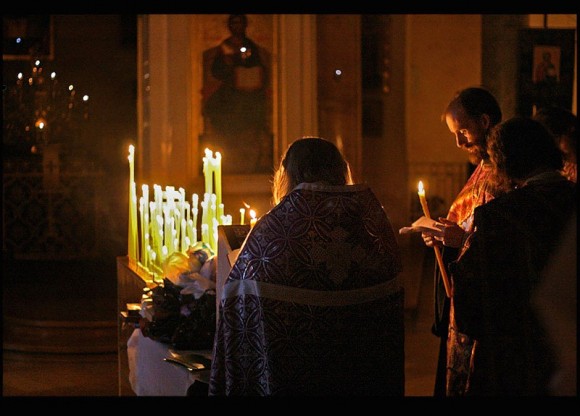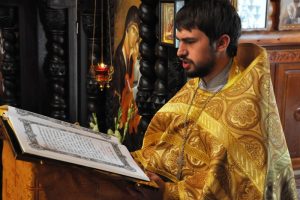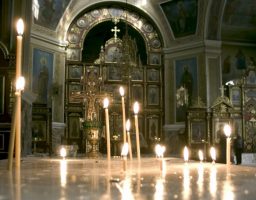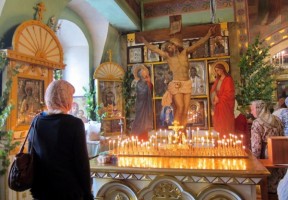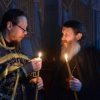Two plus two does not equal four
There are two indisputable truths. First: we will all die; second: we do not know when. People constantly debate the second statement, falling back on the latest statistical data about life expectancy. There is only one way to pacify such debaters: by inviting them to a cemetery. There, on the tombstones and monuments, one can find without fail two numbers that flatly refute all statistical calculations.
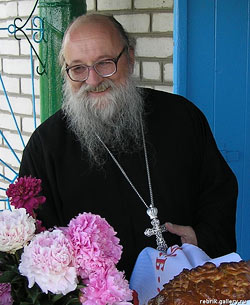 None of us knows how many years we have left, for it is not we who decided when to be born, and it is not for us to decide when we will die.
None of us knows how many years we have left, for it is not we who decided when to be born, and it is not for us to decide when we will die.
It would seem that all this is intelligible, clear, and well known; that there is no need for repeating banalities. But this just happens to be a case when “two plus two” does not equal “four.”
The inevitability of death does not at all become the central thing in our lives. The celebrated phrase “the remembrance of death” has become, even among the Orthodox, a colloquial expression with no bearing whatsoever on our daily lives and activities. Only in the evening, when we attentively read our evening prayers, do we get reminded of this: “Behold, the coffin lieth before me; behold, death confronteth me.” The rest of the time our actions and thoughts are guided by the notion that we will go on living forever here on earth. It is no wonder that the Jehovah’s Witnesses have so many followers, given that the goal of their beliefs is precisely a prosperous eternity on earth.
Tragic events are essentially the only means to compel us to give thought to our own deaths. At any funeral – with the likely exception of those of celebrities, which are not so much funerals as theatrical performances – we try on the coffin for size, consciously or unconsciously.
The measure of our “non-Christianity” before the face of death
All the outraged cries of those who accuse God of cruelty or complicity in tragedy and death are actually expressions of their own fear. We would otherwise simply never grasp or be convinced of the fact that our earthly existence is not eternal. There are practically no other means of convincing us of this today. The righteousness and holiness of the saints are, after all, thought to be due to favorable and special circumstances, or else are simply regarded as legendary. Signs and wonders, of which there is no lack, are studied by scientific methods; when it becomes clear that explaining them away is impossible, this is said to be owing to the fact that science itself is at too low a stage of development. Just as there were no prophets in their own countries, so is this the case now. And how could they even be recognized? After all, one has to humble oneself to be able to recognize them!
We have no right to speak of the “atrocities” of God (and to do so is simply uncivilized) when we ourselves are godless, irresponsible, and careless. Christ is not cruel; He simply stands aside and weeps, seeing how we make use of our free will…
One method only is left for getting us to think about the eternal. The phrase: “His (her) death changed me (made me think),” for all its tragedy, holds a good bit of practical educational value.
When facing the death of a friend or loved one, very often there arises a feeling of the irrelevance of many of our seemingly natural and habitual actions, thoughts, and conversations; that is, of all the things we take for granted in our daily lives. This feeling of confusion, incomprehension, and unease is precisely the measure of our “non-Christianity.” It is precisely within this “gap” that all these remarkable superstition about funerals fall.
When we understand, willingly or unwillingly, that all our earthly and material acquisitions are useless in the face of death, and that the spiritual in us is so weak and small that we cannot even conquer the renting cry of “why” and “what for,” we attempt to fill this void.
The devil turns up immediately and offers “rules” of behavior and action, the only purpose of which is to force us to dance to the tune of paganism here, too. Hence, we forsake prayer, contrition of heart, and the commemoration of the reposed in church, and instead we start observing “rules” cooked up by the enemy, the main purpose of which is to get us to forget ourselves in our daily rush and to distract ourselves from thinking either about the deceased or about our own inevitable end.
Why do priests wear bright vestments rather than black mourning apparel at funerals?
In its daily prayers, the Church reminds us always that we must be ready for an event that none of us can escape: our passage to Eternity. This does not at all mean that Christians should be sullen, joyless, gloomy, and mournful. Not in the least! The remembrance of death does not get in the way of cheerfulness and vivaciousness; on the contrary, they become more precious and valuable. It is for this reason that priests do not wear black mourning apparel at funerals, but rather the bright vestments of the coming resurrection. This likewise explains why believers willingly think and talk about their own deaths, while those living without God philosophize along the lines of “everybody ends up there” and try not to think about the inevitable.
I will always remember the words of a ninety-year-old woman who managed to preserve a positive attitude towards the world and those around her to the end of her days. Although she had lived through all the vicissitudes of history and had buried an innumerable number of relatives and loved ones, she did not lose heart even in painful old age.
In reply to my question about how it is possible to live without “weeping and wailing,” this babushka pulled out of her battered handbag an ancient commemoration book bound in Tsarist times and, opening it, said: “See, I pray for my departed ones, and they guard me here. In fact, they’ve promised to meet me there!”
Thus, our prayers for the departed are not in vain. The Church reminds us of this several times a year with its ancestral Saturday memorials. We are asked to remember right now, not putting it off for the coming day, those who are already standing before God’s judgment. Our prayers for the reposed are actually thoughts about ourselves, given that time passes so quickly.
Translated from the Russian.












